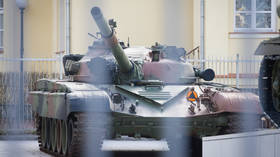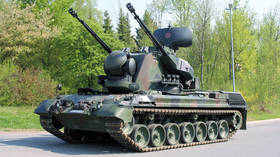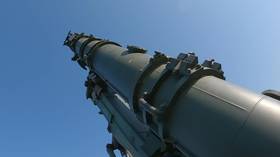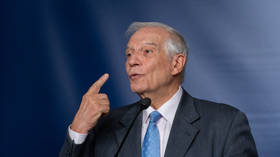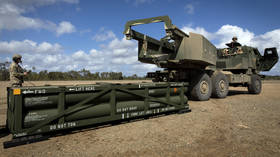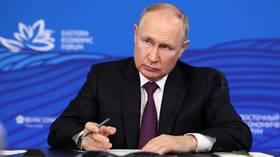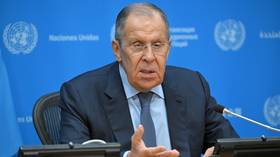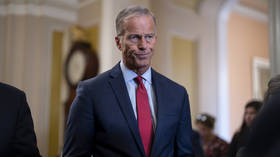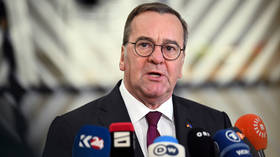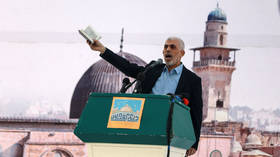Russia reminds Germany of how WW2 ended

Dmitry Medvedev, who served as Russia’s president from 2008 until 2012, has alluded to how the Second World War ended for Germany, after Berlin lawmakers supported the delivery of heavy weapons to Ukraine.
In a post published on Thursday on his Telegram channel, Medvedev suggested that sitting German lawmakers are envious of the “laurels of their predecessors who sat in the German parliament under a different name in the last century.” The Russian official warned that a situation like that “ends sadly” for the German parliament.
The close ally of President Vladimir Putin is currently the deputy chairman of the country’s security council.
Medvedev's remarks came shortly after the German Bundestag passed a motion demanding that the federal government in Berlin deliver heavier and more complex weaponry to Kiev, so that Ukraine is better equipped to defend itself in the face of the Russian offensive.
Titled “Defend peace and freedom in Europe – comprehensive support for Ukraine,” the document was backed by 586 lawmakers, with 100 more voting against and seven abstaining.
Proposed by the ruling coalition and the Christian democratic opposition, the motion calls for an “acceleration of the delivery of more effective, also heavier weapons and more complex systems by Germany.” The lawmakers, however, noted that the shipments should not be carried out at the expense of Germany’s own defense capabilities.
During the debate, lawmakers from the right-wing Alterative for Germany and Left parties opposed the proposal.
On top of the call for heavy weaponry to be provided to Ukraine, the motion also gave backing to all the steps taken by Olaf Scholz’s government up to now, including sanctions against Russia and assistance in the investigation of alleged war crimes committed in Ukraine. Moreover, the lawmakers supported the German government’s push to make the country less dependent on Russian energy.
“The German Bundestag condemns Russia’s brutal aggressive war against Ukraine in the strongest possible terms,” the motion reads. The document also accuses the Kremlin of “breaking international humanitarian law in a blatant manner,” as well as attempting to “destroy the European peace order permanently.”
On Tuesday, Germany’s Defense Minister Christine Lambrecht announced that the government in Berlin had given the green light for the delivery of self-propelled anti-aircraft guns to Ukraine. She broke the news during defense talks hosted by US Defense Secretary Lloyd Austin at the American airbase Ramstein in Germany’s Rhineland-Palatinate state.
Lambrecht explained that “Ukraine will order” hardware from German manufacturers and “Germany will pay.” To fund the scheme, Berlin would earmark some two billion euros, the minister said.
According to reports in the German media, defense firm Krauss-Maffei Wegmann could ship as many as 50 self-propelled anti-aircraft guns of the Gepard type, decommissioned by the German military back in 2010, but still in stock. Designed to shoot down cruise missiles and aircraft, the hardware can also engage targets on the ground. German officials stopped short of divulging any concrete dates when Kiev could expect to receive the Gepards. Several German media outlets, however, reported that the hardware would first have to be refurbished by the manufacturer, before it could be shipped to Ukraine.
The planned delivery would come on top of the swap scheme under which eastern European nations donate their soviet-made heavy weaponry to Ukraine, and receive military hardware from Germany instead. Berlin also pledged to assist the Ukrainian military in terms of training.
Earlier in April, reports appeared in several German media outlets suggesting that the country’s Rheinmetall arms manufacturer was prepared to sell 88 decommissioned Leopard tanks to Ukraine, along with ammunition, spare parts and tools. The company was reportedly awaiting the German government’s approval to go ahead with the shipment.
Russia, for its part, has repeatedly criticized NATO arms supplies to Ukraine, insisting they hamper the prospect for peace in the country. Moscow also made it clear that any military hardware deliveries would be considered a legitimate target for the Russian forces once they crossed the Ukrainian border.
“NATO is essentially going to war with Russia through a proxy and arming that proxy. War means war,” Russia’s Foreign Minister said on Monday.
Russia attacked the neighboring state in late February, following Ukraine’s failure to implement the terms of the Minsk agreements, first signed in 2014, and Moscow’s eventual recognition of the Donbass republics of Donetsk and Lugansk. The German- and French-brokered protocols were designed to give the breakaway regions special status within the Ukrainian state.
The Kremlin has since demanded that Ukraine officially declare itself a neutral country that will never join the US-led NATO military bloc. Kiev insists the Russian offensive was completely unprovoked and has denied claims it was planning to retake the two republics by force.
